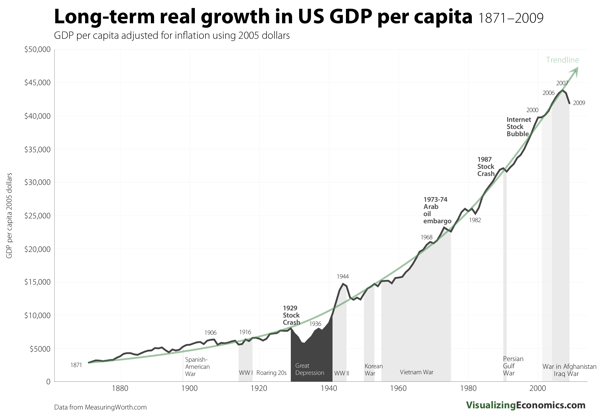Update 2: I’ve replaced the final chart with one that shows long-term real GDP growth per capita.
Update 1: I’ve corrected the debate kickoff time, below.
The U.S. economy is, of course, at the center of this year’s presidential race.
As the first 2012 presidential debate approaches tonight (it begins at 8 p.m. 9 p.m. eastern), pundits and voters — not to mention, ahem, business journalism students — have been examining U.S. economic issues and the positions taken by President Obama and Mitt Romney.
To sum up: Romney and his team say that Obama’s economic policies have failed to adequately lift the U.S. economy out of the 2000-2009 recession.
Among other data, they point to the ongoing high unemployment rate, which is currently at 8.1 percent:
Obama’s critics also note the U.S.’s slow economic recovery in terms of real GDP.
The American economy expanded by just 1.3 percent during the second quarter this year:

In the debate tonight, Romney will also likely focus on the U.S. deficit. He says Obama would need to employ tax increases to pay down the debt in the years to come.
Obama and his supporters, meanwhile, have been pointing out just how severe the “Great Recession” was. They say the recovery is happening (albeit slowly).
The recession was, indeed, the worst downturn since the Great Depression in terms of unemployment and GDP.
Here’s the GDP data for the last few years a look at long-term per capita real GDP growth from the 19th century through 2009. Check out the dip after the Great Depression and the downturn after 2008:

(Graph via the excellent VisualizingEconomics.)
Team Obama notes that private sector jobs have been on the rise for 30 straight months.
The president will likely point out this evening that the auto bailout saved more than one million jobs.
As it happens, in my business seminar class, we recently discussed notions of the economic consensus. While many economists have many different opinions, there’s actually a lot that most agree on.
Here’s an interesting 2009 blog post from Harvard economist Greg Mankiw called “News Flash: Economists Agree.”
A few points from his post:
Fiscal policy (e.g., tax cut and/or government expenditure increase) has a significant stimulative impact on a less than fully employed economy. (90%)
Obama will say taxes need to be raised on the very wealthy; as part of the supply side argument, Romney will argue that tax cuts for most voters are the way to go.
How about this one? I doubt Obama will mention this as he criticizes Romney for outsourcing jobs:
The United States should not restrict employers from outsourcing work to foreign countries. (90%)
And here’s one for Romney:
A large federal budget deficit has an adverse effect on the economy. (83%)
That’s it for now. More on some of these topics in future posts, I’m sure.

